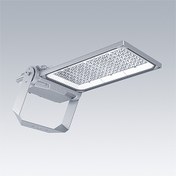Areaflood Pro 2 / AFP2 L 144L70 740 A5 H CLO BS 3525 SP ->
92998080
▼ Data Sheet
A compact, lightweight, general purpose LED area floodlight. With large body. LED converter driving 144 LEDs at 700mA with asymmetrical 50° light distribution. IP66, IK08, Class I electrical. Body: die-cast aluminium (EN AC-44300), Light grey 150 sanded textured (close to RAL9006). High transmission Glass. Enclosure: 5mm thick toughened glass. Reversable mounting stirrup supplied, optional spigot adaptors available separately for post top mounting. BSxyzz: Autonomous, physically disconnectable, bi-power reduction (x: hours before midnight, y: hours after midnight, zz: reduction (%)). Driver programmed for constant light output. Fitted with 10kV surge protection. Pre-wired with 3m, 1.5mm² H07RN-F cable. Complete with 4000K LED.
Dimensions: 729 x 360 x 115 mm
Luminaire input power: 298 W
Luminaire luminous flux: 47016 lm
Luminaire efficacy: 158 lm/W
weight: 14.18 kg
Scx: 0.068 m²
- LED
- 0.5
- BWS - ball proof
- CE
- ENEC
- ENEC+
- GLedReP
- IK08
- IP66
- Coastal_C5
- LLedReP
- Electrical class I

